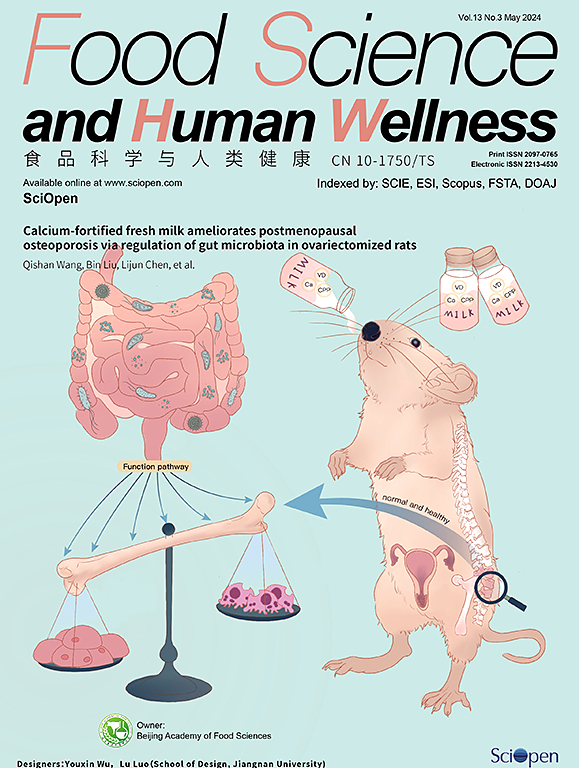枳实提取物通过抑制肠道微生物群介导的小鼠炎症缓解抑郁症
IF 7.4
1区 农林科学
Q1 FOOD SCIENCE & TECHNOLOGY
引用次数: 0
摘要
肠道菌群在抑郁症的病理生理中起着至关重要的作用。本研究旨在探讨成熟全金柑提取物(FEMC)对慢性不可预测轻度应激(CUMS)模型的抗抑郁作用。采用行为测试评估抗抑郁效果,采用16S rRNA测序分析肠道菌群变化。结果表明,FEMC的主要成分为柚皮苷和新橙皮苷,可显著提高小鼠的蔗糖偏好指数。FEMC还可以减少空地试验中的进食潜伏期和新颖性抑制试验中的休息时间。此外,FEMC可以增加cms诱导的海马BDNF、PSD95和SYN水平的降低。此外,FEMC干预略微降低了厚壁菌门与拟杆菌门的比例。同时,FEMC降低了与炎症密切相关的prevotellaceae_ga6a1 - group, [Ruminococcus]_torques_group的丰度。生物信息学分析表明,在CUMS动物模型中,FEMC的抗炎作用与丝裂原活化蛋白激酶(MAPK)信号通路和脂多糖的生物合成有关。最后,ELISA结果显示,FEMC可显著降低抑郁小鼠血清中促炎因子IL-6和TNF-α的表达。我们的研究结果表明,FEMC可以通过抑制肠道菌群介导的炎症来改善小鼠的抑郁行为。本文章由计算机程序翻译,如有差异,请以英文原文为准。
Citrus aurantium L. extract alleviate depression by inhibiting gut microbiota-mediated inflammation in mice
Gut microbiota plays a crucial role in the pathophysiology of depression. This study aimed to explore the antidepressant effect of mature whole Citrus aurantium fruit extract (FEMC) in the chronic unpredictable mild stress (CUMS) model. The behavioral tests were applied to assess antidepressant effect and 16S rRNA sequencing was used to analyze the changes of gut microbiota. The results showed that the major components of FEMC were naringin and neohesperidin and significantly increased the sucrose preference index of the mice. FEMC also could reduce the feeding latency in an open field test and the rest time in a novelty suppressed feeding test. In addition, FEMC could increase CUMS-induced reduction in the levels of BDNF, PSD95, and SYN in the hippocampus. Moreover, FEMC intervention slightly decreased the ratio of Firmicutes to Bacteroidota. Meanwhile, FEMC reduced the abundance of the Prevotellaceae_Ga6A1_group, [Ruminococcus]_torques_group, which have been reported to be closely related to inflammation. Bioinformatics analysis revealed that mitogen-activated protein kinase (MAPK) signaling pathway and lipopolysaccharide biosynthesis were involved in the anti-inflammatory effect of FEMC in the CUMS animal model. Finally, the ELISA results showed that FEMC could significantly reduce the expression of pro-inflammatory cytokines IL-6 and TNF-α in the serum of depressive mice. Our results suggest FEMC can ameliorate depressive behavior by inhibiting gut microbiota-mediated inflammation in mice.
求助全文
通过发布文献求助,成功后即可免费获取论文全文。
去求助
来源期刊

Food Science and Human Wellness
Agricultural and Biological Sciences-Food Science
CiteScore
8.30
自引率
5.70%
发文量
80
审稿时长
28 days
期刊介绍:
Food Science and Human Wellness is an international peer-reviewed journal that provides a forum for the dissemination of the latest scientific results in food science, nutriology, immunology and cross-field research. Articles must present information that is novel, has high impact and interest, and is of high scientific quality. By their effort, it has been developed to promote the public awareness on diet, advocate healthy diet, reduce the harm caused by unreasonable dietary habit, and directs healthy food development for food industrial producers.
 求助内容:
求助内容: 应助结果提醒方式:
应助结果提醒方式:


